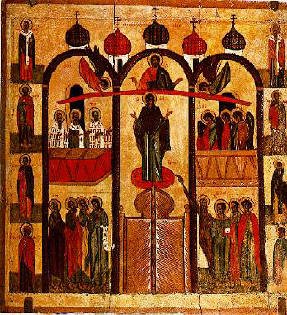
I'm soon to share my thoughts and embark on a discussion of the Christian practice of praying for the dead. To prime the pump, so to speak, I've included the Catechism question from the '79 BCP on the subject below.
If you're curious as to what my approach will be, I encourage you to read my earlier thoughts on the somwhat related issue of the Invocation of the Saints, which can be accessed here, here, and here.
Until then...
Q. Why do we pray for the dead?
A. We pray for them, because we still hold them in our love, and because we trust that in God's presence those who have chosen to serve him will grow in his love, until they see him as he is. (Catechism of the 1979 Book of Common Prayer)

5 comments:
Of course, praying for the dead and praying to the dead are different things. The '79 Prayer Book cathecism says nothing that is substantively different from what we read in The Prayer for the Whole State of Christ's Church. As I see it, continual growth in God's grace is true both for the Church expectant and the life of the world to come. How in the world could a creaturely participation in the life of the Holy Trinity ever be static?
-Mark
Mark,
Participation in the divine life could be static if God were absolutely simple and therefore there is only one good to will.
Methinks this is yet another attempt to chip-away at the Western edifice ( that's okay, though ).
Point well taken, acylote. Speaking rather subjectively,I find the idea of an eternal stasis- even if that state will be experienced by divinized creatures- a depressingly dull one.
-Mark
Mark,
As well you should. This is why most western depictions of heaven are boring and all of the exciting stuff is happening in hell.
By contrast, the Orthodox model has the saints enjoying the infinite goods or energies of God whereas those in hell cannot choose to enjoy such goods according to their own way of willing, which is why they are bored to tears.
Does Orthodoxy understand the enjoyment of God's energies as an uniquely mediated form of bliss? IOW, does participation in the Divine life come exclusively through the mediation of Christ's humanity, or-as I like to fancy-is it mediated through Christ and His now glorified brothers and sisters? In my more whimsical moments, I like to imagine a kind of beatific vision that comes in part via creatures who have been released from futility;
Daydreams, only daydreams
-Mark
Post a Comment